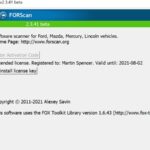Spn 4364 Fmi 18 signals a problem with your diesel engine’s aftertreatment system, specifically a low NOx conversion efficiency. This fault code indicates that the Selective Catalytic Reduction (SCR) system isn’t effectively reducing harmful nitrogen oxide (NOx) emissions. Understanding this code is crucial for maintaining engine performance and complying with emission regulations. This article delves into the causes, symptoms, and solutions for SPN 4364 FMI 18.
Decoding SPN 4364 FMI 18
SPN stands for Suspect Parameter Number, and FMI stands for Failure Mode Identifier. SPN 4364 FMI 18 specifically points to a problem with the SCR NOx conversion efficiency. The SCR system uses Diesel Exhaust Fluid (DEF) to convert NOx into harmless nitrogen and water vapor. When the conversion efficiency drops below acceptable levels, the engine control module (ECM) triggers this code.
Common Causes of SPN 4364 FMI 18
Several factors can contribute to a low NOx conversion efficiency, triggering the SPN 4364 FMI 18 code. These include:
- Faulty NOx Sensor: A malfunctioning sensor can provide inaccurate readings to the ECM, leading to an incorrect diagnosis of low efficiency.
- DEF System Issues: Problems with the DEF system, such as low DEF quality, a faulty DEF injector, or incorrect DEF dosing, can hinder the SCR process.
- SCR Catalyst Damage: A damaged or contaminated SCR catalyst can significantly reduce its ability to convert NOx.
- DPF Clogging: A clogged Diesel Particulate Filter (DPF) can restrict exhaust flow, impacting the SCR system’s performance.
- EGR System Malfunction: Issues with the Exhaust Gas Recirculation (EGR) system can affect combustion efficiency and contribute to higher NOx levels.
Recognizing the Symptoms
While the illuminated check engine light is the most prominent symptom, other indicators may include:
- Derate Mode: The engine’s power output may be reduced to limit emissions.
- Decreased Fuel Efficiency: Lower engine performance can lead to increased fuel consumption.
- Performance Issues: You might experience reduced acceleration, sluggish response, or other performance problems.
Diagnosing and Resolving the Issue
Diagnosing SPN 4364 FMI 18 requires specialized diagnostic tools that can read and interpret fault codes from the ECM.
- Professional Diagnostics: Utilizing a diagnostic laptop with appropriate software can pinpoint the root cause of the problem.
- Component Inspection: Once the faulty component is identified, thorough inspection and testing are necessary. This might involve checking the NOx sensor, DEF system components, SCR catalyst, and DPF.
- Repair or Replacement: Depending on the diagnosis, the faulty component may need repair or replacement.
Preventing Future Occurrences of SPN 4364 FMI 18
Regular maintenance is crucial for preventing SPN 4364 FMI 18 and ensuring the longevity of your aftertreatment system.
- Quality DEF: Use high-quality DEF that meets industry standards.
- Scheduled Maintenance: Adhere to the recommended maintenance schedule for DPF cleaning, DEF system checks, and SCR catalyst inspections.
- Proper Driving Habits: Avoid excessive idling and aggressive driving, which can contribute to increased emissions and stress on the aftertreatment system.
Conclusion
SPN 4364 FMI 18 indicates a critical issue with your engine’s emissions system. Addressing this problem promptly is essential for maintaining optimal engine performance, complying with environmental regulations, and preventing costly repairs down the line. By understanding the causes, symptoms, and solutions for this fault code, you can take proactive steps to ensure the health and efficiency of your diesel engine. Investing in a reliable diagnostic tool can empower you to troubleshoot and address issues effectively. Contact us for more information on diagnostic solutions.

